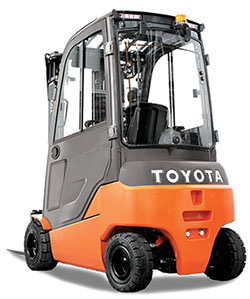FORKLIFT SAFETY - A REFRESHER COURSE
No matter how experienced a forklift operator may be, there is always the potential for unforeseen issues and costly accidents. That's why it pays to consistently brush up on helpful forklift safety tips, designed for avoiding many issues that you can maintain control over. They may seem obvious, but human nature has a tendency to allow high-awareness practices to slip into comfortable routines, which can lead to being caught off guard. So, even if you've recently scanned a Forklift Safety poster, take the time to read the following tips, so you'll feel like you've had a good, healthy refresher course before mounting that forklift next time.
- First, the employer has the responsibility to provide adequate and safe personal protective equipment. Operators may be required to wear safety boots, safety glasses, hard hat, high visibility vest, and gloves.
- Always make sure your load is secure before moving it. It should be tilted back over both low-sitting forks during transport in order to increase lift truck stability. Secure the load with ropes or bindings for extra stability.
- When mounting, be sure your hands or gloves and shoes are free from grease to prevent slippage. Get a firm grip and pull or lower your body carefully in and out of the cab. Always watch for clear head space.
- Do a forklift safety check before driving. Check for faulty brakes, steering, controls, warning devices, mast and tires. If everything checks out okay, securely fasten your seat belt, adjust the mirrors and start the motor.
- Ensure your way is unobstructed. Always keep a clear view of your path of travel, staying vigilant and alert for pedestrians or other moving objects coming into your path. Be constantly ready to brake.
- Drive only in the designated roadways, staying aware of clearances for the height of the load, mast and overhead guard of the forklift when entering or exiting buildings. Observe all posted forklift road signs.
Speed awareness is a main forklift safety component. It must always be adjusted for surface issues, etc. Consider the following set of points for speed safety:
- Always operate at a speed that will allow you to a stop in a safe manner.
- If there is a posted speed limit, never exceed it.
- Take corners and any turns slowly to minimize risk of tipping.
- Slow down for wet or slippery floors.
- Slow down and sound your horn in warning or use a spotter if your view is obstructed.
- Always ascend or descent on grades slowly.
- Make any changes in direction or any stops gradually and slowly.
Driving a forklift in reverse requires extra caution and precaution. Consider the following set of points for reversing or backing up a forklift:
- Keep a clear view behind you at all times.
- Consider the use of ground guides, rear-view mirrors, spotters, or other aids to increased visibility
- Be mindful of pedestrians; don't assume they are able to hear a back-up alarm.
- Move at a slow speed, making sure you're staying in the required path.
- Do not grab the overhead guard when traveling in reverse. This could expose fingers to serious injury.
- To keep from tipping over on grades, always keep your load upgrade, using reverse going down to maintain this position. For extra forklift safety, never turn around on a grade.
While parking and leaving an unattended forklift, remember these recommended practices:
- Always select a hard, level surface.
- Do not park on a grade without first blocking the wheels.
- Park in authorized areas only, a safe distance from fire aisles, stairways or fire equipment.
- Fully engage the parking brake.
- Fully lower the load forks.
- Turn the key to OFF, and stop the engine. Always remove the key.
- Safely dismount.
A final reminder to you is to acknowledge National Forklift Safety Day, on June 12 this year. Go to https://www.indtrk.org/national-forklift-safety-day to learn more about it. It's a great way to draw national awareness to the importance of keeping up on vital forklift safety education. Also remember that your Toyota forklift dealer is always working to keep you in the best equipment available. If you are looking for forklift rentals or new forklift sales contact any of our 5 locations in North Carolina and Virginia.

